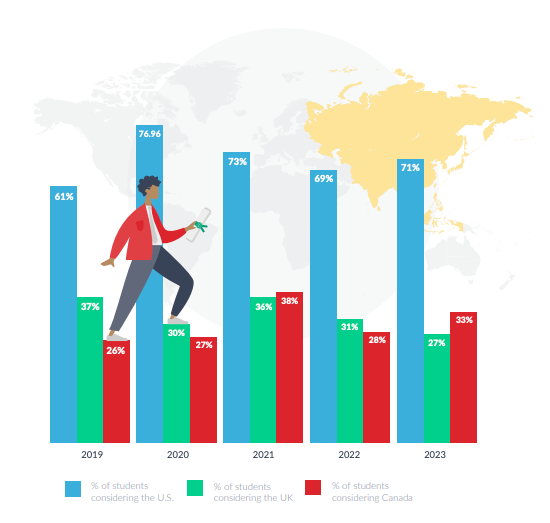Canada: IRCC expands range of accepted SDS English tests
Immigration, Refugees and Citizenship Canada has expanded the range of accepted English language tests for the Student Direct Stream, causing the shares of previous monopolisers IDP to plummet.
Previously, the Canadian government only accepted IDP Education’s IELTS but the move means Prometric’s CELPIP General and CAEL, along with Pearson PTE Academic and TOEFL iBT Test will also be accepted.
“The changes bring Canada in line with the other key markets which are all competitive from an English language testing perspective,” a spokesperson for IDP told The PIE.
Following the news, it was reported that the Australian international education giant’s shares fell 16%, down $4.11 to $21.71.
This translated to $1.14 billion in sharemarket capitalisation vanishing, the Financial Review reported.
However, IDP told The PIE it is “confident that IELTS will maintain its leadership position in a sector that plays an important role for international education and global mobility”.
“IELTS has faced changes in the testing landscape many times with government’s periodically adjusting which tests they recognise. We’ve been delivering IELTS tests for 35 years, and IELTS continues to be the test trusted by governments to assess English language proficiency,” the spokesperson continued.
It is recognised by more than 11,000 organisations, “provides unique flexibility for test takers with multiple modes of delivery and is widely available with the largest distribution network”, they added.
“We welcome the changes to the Student Direct Stream and look forward to supporting more students who wish to live, work, and study in Canada with our CAEL and CELPIP – General tests,” said Michael Holaday, vice president of business development at Prometric.
“These products were developed right here in Canada and have already been an integral part of many people’s immigration and study plans.”
ETS is “thrilled to be unlocking more opportunities for students to access one of the world’s most desirable study abroad destinations”, said Rohit Sharma, senior vice president of Global Higher Education and Workskills.
“Not only will the addition of TOEFL benefit the hundreds of thousands of students who take advantage of the SDS route each year, but institutions can feel confident knowing that they can access a wider pool of applicants who can demonstrate their skills with the premier test of English-language proficiency,” Sharma added.
In 2022, Canada reached an all-time high of number of international students. As of the end of October 2022, IRCC processed over 750,300 study permit applications during the 2022 calendar year, an increase on 590,000 applications processed in the previous year.
“Canada is a great place to be a student – fantastic colleges, beautiful scenery, exciting culture and nightlife,” said Andy Bird, CEO, Pearson.
“With PTE Academic now recognised for SDS purposes, I’m delighted that Pearson can help even more test takers achieve their dream of studying there.
“This recognition comes hot on the heels of PTE Core being approved for Canadian economic migration purposes earlier this year and reflects our determination to make PTE the test of choice for everybody wanting to live, work or study abroad.”
The new test providers will be accepted from August 10, 2023.
The IRCC’s decision is not expected to have a material impact on the company’s FY23 revenue or earnings
Launched in 2018, the SDS offers expedited processing of study permits for students who are legal residents from specific eligible countries; Antigua and Barbuda, Brazil, China, Colombia, Costa Rica, India, Morocco, Pakistan, Peru, Philippines, Senegal, Saint Vincent and the Grenadines, Trinidad and Tobago and Vietnam.
IRCC processes most SDS applications within 20 days if eligibility requirements are met, which includes a purchase of a Guaranteed Investment Certificate – a CAN$10,000 deposit in a bank account in Canada which guarantees a rate of return over a fixed period of time, among other criteria.
Some commentators have taken to social media to discuss the significance of the decision for IDP and its competitors.
“On the one hand, this is overdone. There is no way that language tests for Canadian SDS visas account for 16% of IDP’s profits, and the analyst calls on this are over-stated,” said Edward Slade, managing director, Schoolhouse Solutions in a LinkedIn post.
“However, there is no doubt that IDP is losing market share across all of its businesses. Students want a language test they can take from their desk, online, anytime, with instant results. Duolingo provides that at a 70% lower price than IELTS and is now accepted by 4,000 institutions, including Go8 and Russell Group.
“IDP’s other key driver, agency, will also be under pressure. Universities are tired of paying away 30% of tuition fees to networks of marketing agents. In an age where online direct application is simple, top students are increasingly confident that they can apply without outside help.
“The landscape is changing, and while IDP remains a great business, maybe it doesn’t deserve a rating of over 6x forward revenues.”
Nishidhar Reddy, president, Association of Australian Education Representatives in India, said the association “welcomes the acceptance of other English tests by IRCC’s for the Student Direct Stream for Canada”.
“While this is for Canada and since Australia already accepts PTE and TOEFL, the students always preferred a test that is accepted across all destinations. Since both PTE and TOEFL are computer based with multiple centres all across India and they issue quick results, it’s a real advantage.
“The students have more options now,” added Reddy.
The post Canada: IRCC expands range of accepted SDS English tests appeared first on The PIE News.










